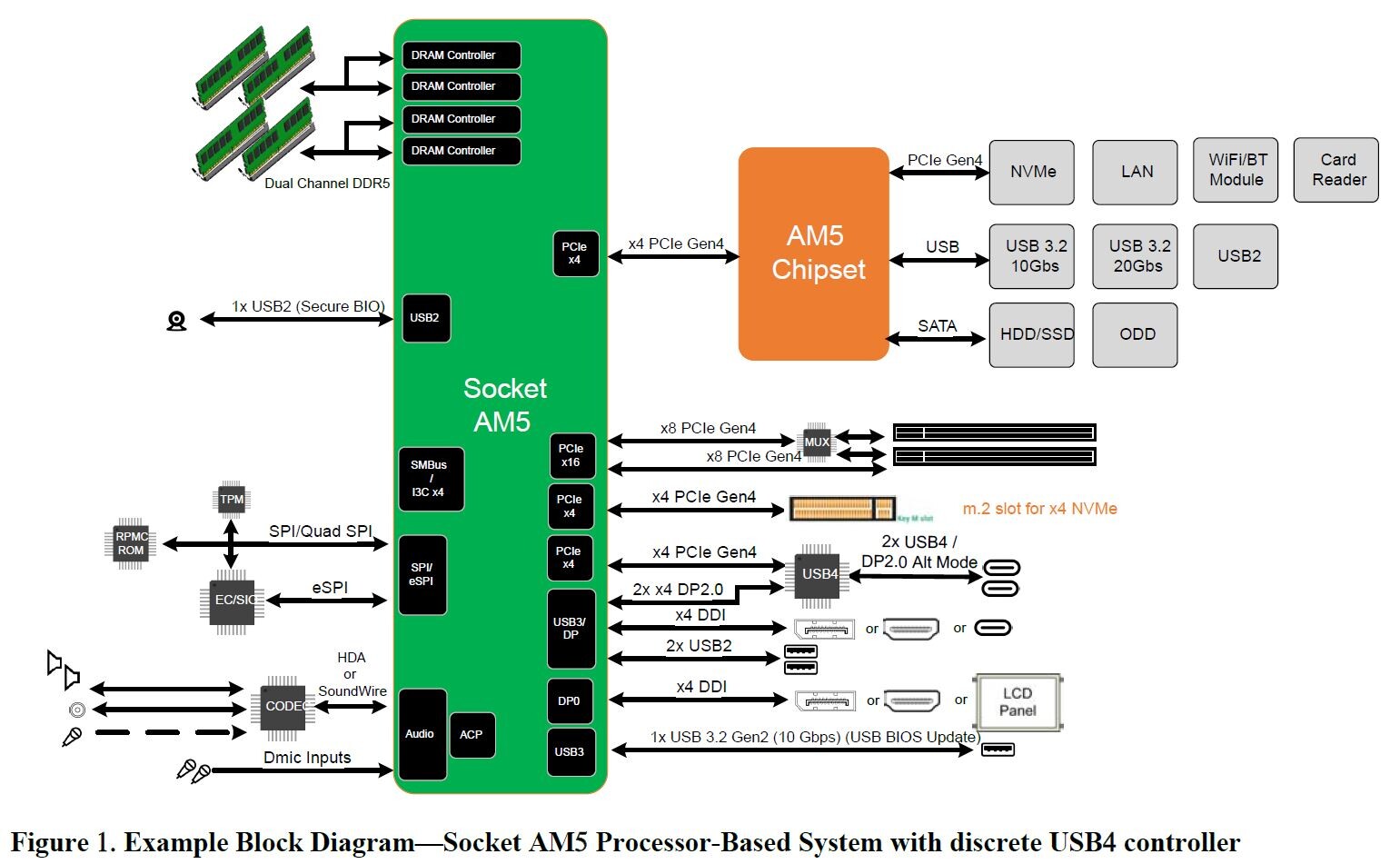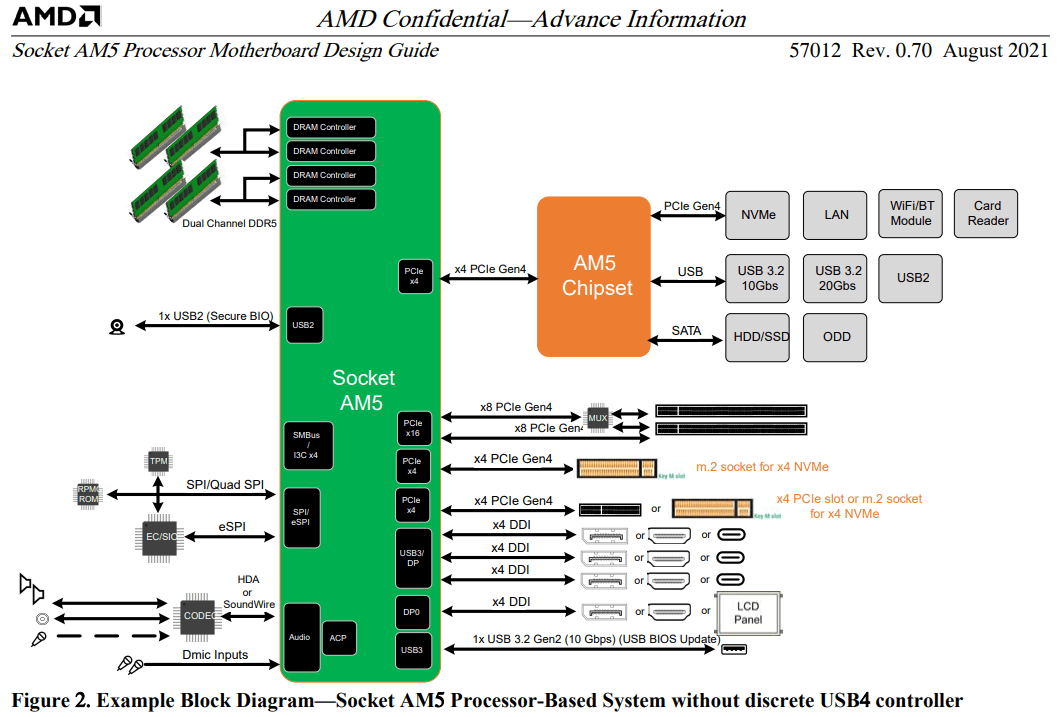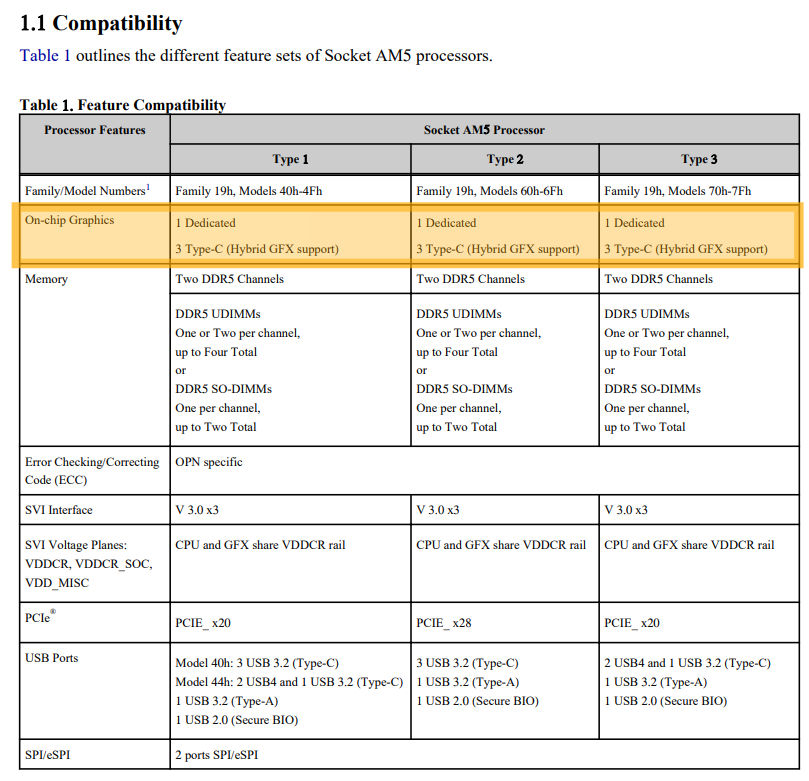AMD Zen 4 Processors Could Offer Integrated Graphics Across More SKUs
Zen 4 cores and RDNA 2 graphics
AMD currently only offers integrated graphics in its APUs, however, we could witness the crossover of APUs and regular CPUs in the upcoming product line-ups. According to the latest data exploration of the recent Gigabyte hack, Chips and Cheese found data about the inclusion of integrated graphics in the upcoming AMD processors with Zen 4 cores.
According to the data from the Gigabyte hack, AMD is preparing to add integrated graphics to Ryzen processors with Zen 4 cores inside them. This is similar to what Intel has done with its consumer processors equipped with an iGPU, no matter the SKU, though team blue also has an option to purchase the "F" CPU SKU that ships with the iGPU disabled.
AMD's current consumer PC processor line-up consists of two very distinct products: Ryzen CPUs and Ryzen APUs. The CPUs contain only what they advertise - processor cores stuffed on a die. To run a system with a Ryzen CPU, a user needs a dedicated graphics card to display any content. However, AMD also makes Ryzen APUs that feature integrated graphics so you don't need a discrete GPU. That is seemingly about to change.
The table above shows that AMD is preparing to launch three types of processors based on the Zen 4 microarchitecture, and all three of them support integrated graphics. That means that AMD could manufacture its future CCDs or IODs with graphics cores etched into the silicon, just waiting to be used in the appropriate SKUs. However, this could also just signify that AMD is absorbing the iGPU-equipped models further into its standard product stack — much like it did with the Ryzen 5000G products when it added them as the non-X equivalents.
A previously-leaked roadmap indicated that AMD could integrate Navi 2 (RNDA 2) graphics into the upcoming Zen 4 Raphael processor line-up that drops into socket AM5. In the image below, you can see the new AM5 diagram and compare it to the previous one.

Old AM5 Diagram (TechPowerUp)

New AM5 Diagram (Chips and Cheese)
As motherboard makers begin the transition to the newest AM5 platform, we could see more video output ports added to the I/O portfolio, as the integrated graphics options are going to offer a much wider area of applications for AMD products. Whether or not the new information indicates that all Ryzen processors will come with integrated graphics is now up for debate. There's certainly a possibility that this just represents that the APU lineup will come with standard Ryzen branding.
Get Tom's Hardware's best news and in-depth reviews, straight to your inbox.
-
mikewinddale Unfortunately, this might mean reduced support for ECC. I was so happy when the Ryzen supported ECC. But the APUs don't. Now I'm worried the next-gen Ryzen won't support ECC either.Reply -
AlB80 Reply
The PRO series (including APUs) has official ECC support . So this might mean reduced unofficial ECC support only. Thus you should get the next-gen Ryzen PRO.mikewinddale said:Unfortunately, this might mean reduced support for ECC. I was so happy when the Ryzen supported ECC. But the APUs don't. Now I'm worried the next-gen Ryzen won't support ECC either.
ps. There is a small chance that AM5/DD5 is turning point for general ECC support. -
spongiemaster Reply
Pro APU's have unofficial ECC support. ECC support has not been validated on Pro APU's, but if you have a motherboard that supports ECC memory, it should work with Pro APU's. There is no firmware error reporting, so you'll have to use a work around to determine if ECC is actually working properly and not just reporting that it has been enabled.AlB80 said:The PRO series (including APUs) has official ECC support . So this might mean reduced unofficial ECC support only. Thus you should get the next-gen Ryzen PRO.
ps. There is a small chance that AM5/DD5 is turning point for general ECC support. -
mikewinddale ReplyAlB80 said:Thus you should get the next-gen Ryzen PRO.
Unfortunately, the pro isn't sold retail.
So I might just have to stick with ThreadRipper.
I recently built a ThreadRipper Pro with 512 GB of RAM - 8x64.
I was hoping that with DDR5 topping at 128 GB per module, I might be able to someday build a computer with a consumer-grade CPU and motherboard, with 4x128 GB. But maybe I'll have to stick with ThreadRipper for the ECC. -
mikewinddale Replyspongiemaster said:There is no firmware error reporting, so you'll have to use a work around to determine if ECC is actually working properly and not just reporting that it has been enabled.
For what it's worth: with my Ryzen 7 2700X + Gigabyte X470 Aorus Gaming 7 WiFi + Kingston ECC UDIMM, I successfully verified ECC.
I overclocked my RAM just short of failing to POST. Then I ran Memtest86 Pro. Within a few seconds of starting the test, it reported dozens of corrected ECC errors.
I am not sure if Windows WHEA would have reported them, but I assume it would have, since Memtest86 knew they were corrected ECC errors. -
spongiemaster Reply
Memtest86 is one of the third party workarounds to verify if ECC is actually working on Ryzen platforms. It should be noted, that no consumer Ryzen CPU including the Pro versions officially support ECC. Some unofficially support it, and some don't at all.mikewinddale said:For what it's worth: with my Ryzen 7 2700X + Gigabyte X470 Aorus Gaming 7 WiFi + Kingston ECC UDIMM, I successfully verified ECC.
I overclocked my RAM just short of failing to POST. Then I ran Memtest86 Pro. Within a few seconds of starting the test, it reported dozens of corrected ECC errors.
I am not sure if Windows WHEA would have reported them, but I assume it would have, since Memtest86 knew they were corrected ECC errors.
